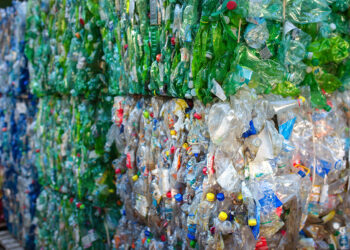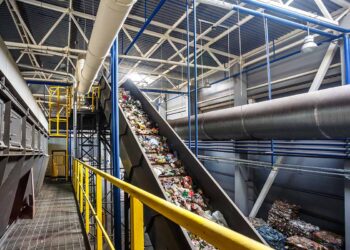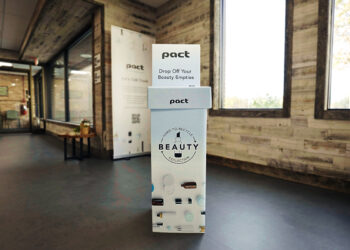A Massachusetts-based recycling firm has filed a lawsuit in federal court alleging that five large plastics companies and the American Chemistry Council have illegally conspired against the company, resulting in harm to its business.
Evergreen Partnering Group, Inc. (EPG), a North Reading, Massachusetts company that offers a patent-pending closed-loop recycling method for polystyrene trays designed for large school systems and other institutions that provide food service, filed the lawsuit in the U.S. District Court for Massachusetts.
According to court documents, EPG commercialized its recycling program in Atlanta with the Gwinnett County Public Schools, had 25 pilot programs with schools in the Miami, Florida area and has also done business with school systems in Boston and Rhode Island among others.
A number of other government and educational entities had also expressed interest in its services, according to the suit, but deals never came to fruition.
The suit alleges that EPG’s business was thwarted by five companies that have significant sway over the polystyrene market, including Pactiv Corporation; Genpack, LLC; Solo Cup Company; Dolco Packaging and Dart Container – all of which were named as defendants along with the American Chemistry Council and its Polystyrene Foodservice Packaging Group. EPG is seeking $25 million in damages for violations of antitrust laws, false advertising, unfair business practices, trade libel and interference with EPG’s prospective economic advantage and contractual relations.
The suit contends that industry leaders Pactiv and Dart have actively resisted recycling of polystyrene because if it were to be done successfully, environmentalists and regulators would pressure makers of the material to recycle their products at a higher level, cutting into their bottom line.
The suit further alleges that the companies it names as defendants used their market influence to dissuade food line distributors, public school systems and food chains from doing business with EPG. If EPG’s business model were to catch on, contends the suit, the polystyrene industry would be pressured into participating in more costly recycling operations.
The ACC’s PFPG violated anti-trust laws by “telling participants what they should do or not do regarding matters relating to actual or potential suppliers that might have the effect of excluding them from the market or influencing the business conduct and consumer choice towards them as well as collectively discussing and reviewing prices, costs, capacities, productions, marketing, etc.,” according to the suit.
Additionally, it claims that the ACC has deliberately sought to spread disinformation on the viability of polystyrene recycling, further damaging EPG’s business.
“ACC/PFPG leadership and members continued from June 2007 – January 2009 with false and deceptive advertising to schools, distributors, state officials and consumers that recycling of food service foam polystyrene was not economically feasible, knowing full well after reviewing EPG’s costs of operations, waste audits, business method and financials that this was not factual,” reads the suit.
EPG says its recycling system for polystyrene is viable and has 10 fully commercialized facilities, which have needed about $1 million in startup capital. However, the suit contends that EPG needs participation from the market’s giants to realize its full potential.
It brings up several specific incidents that it claims harmed its business. According to the suit, in 2004, Sodexo, a company that provides food service, and EPG agreed on a contract to test market its recycling model in various school systems. It claims that Pactiv refused to deal with Sodexo on any matter pertaining to EPG, harming the venture. Additionally, it alleges that Dolco, a maker of foam egg cartons, broke off a business deal with EPG after being pressured by the ACC.
“The plastics foodservice industry strongly supports recycling that is sustainable, economical and environmentally responsible. Since 1990, the broad plastics industry – including the plastics recycling value chain – has invested significantly to increase recycling and educate communities in the United States about recycling,” reads a statement from the ACC in response to the suit. “We believe these allegations are without merit, and ACC’s Plastics Foodservice Packaging Group intends to vigorously defend against these wildly imaginative, but baseless, claims.”
























